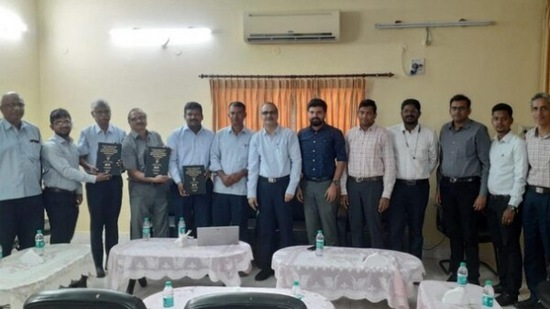Flosbela facilitate one-of-its kind Hydroponics Project inside active mine
In February 2021, Flosbela and the Society for Innovation & Development (SID) - Indian Institute of Science (IISc), Bengaluru, signed a Memorandum of Understanding for carrying out a Hydroponics Project at Neyveli Lignite Corporation of India Limited (NLCIL)

Agricultural technologies are endeavouring to keep up with climate change and population growth, even more in regions where living is arduous. In order to escape this situation and generate a substantial harvest, the adoption of innovative methods, such as hydroponic systems, is essential. Owing to the same, Flosbela recently accomplished the completion of the world's first fully automated Hydroponics Project, located inside an active open casting mine. In February 2021, Flosbela and the Society for Innovation & Development (SID) - Indian Institute of Science (IISc), Bengaluru, signed a Memorandum of Understanding for carrying out a Hydroponics Project at Neyveli Lignite Corporation of India Limited (NLCIL).
The project was constructed at one of the most challenging places. It was a reclaimed lignite mine inside a Central Government organisation with extreme conditions throughout the year, whether it was heat or rain. Another major challenge that the place inherited was that many times, it was inaccessible due to heavy rains flooding roads inside the mining area.
Despite a multitude of challenges, the project's construction was finished by July 28, 2021, and cultivation began in an area 1600 sq. m, accommodating 2418 Dutch buckets and 42 vertical A-Frames of 100 plants each.
The hydroponics method of farming is a unique technique that grows food without soil. It helps to alleviate some of the pests, diseases, and environmental issues that are common to traditional agriculture, leading to higher & more consistent and nutritious yields.
As the global population grows to a whopping 9.8 billion in 2050 and incomes grow across the developing world, overall food demand is on course to increase by 56%, or 7,400 trillion calories. The world needs to close a land gap of 593 million hectares to fulfil this whooping food demand. One strategy to fill this food gap could be to clear more land for agriculture but at the cost of significant harm to forests and other ecosystems.
In addition, nearly 33% of the world's fertile agricultural land has been lost in the past 40 years. The continual ploughing of fields, combined with the heavy use of fertilizers, has degraded soils worldwide. Degraded soils aren't fit for anything except for holding a plant up.
The founder of the company says, "For a sustainable food future, the world needs to boost the productivity of the existing lands by adapting to more efficient, and more sustainable agricultural practices, like hydroponics."
Hydroponics systems like the A-Frame type that uses vertical farming also drastically reduce the space required for cultivation. Approximately 50% more plants are grown in the same area compared to conventional methods. In addition, these farms were equipped with proprietary automated nutrient doser, IoT sensors, evaporative cooling systems, and a host of other technologies that optimize, streamline, and make the process more efficient.
The system precisely dispenses a controlled amount of fertilisers into the system through a recirculating water line, translating to optimum delivery of water and fertilizers per the plant requirements. Furthermore, there is a 95% water use efficiency compared to conventional agriculture.
In the first cycle, Dutch Buckets and A-Frames were used to successfully grow English Mini Cucumber and Napa Cabbage. Further, the second cycle involved the cultivation of bell pepper and strawberry. The project employed six ground staff, including an agronomist, who Flosbela trained on optimal operating procedures and guidelines for the smooth functioning of the programme. The departments in charge of the construction site and SID-IISc provided excellent support, which enabled the project to take off and grow into the success it is celebrating today.
Disclaimer: This article is a paid publication and does not have journalistic/editorial involvement of Hindustan Times. Hindustan Times does not endorse/subscribe to the content(s) of the article/advertisement and/or view(s) expressed herein. Hindustan Times shall not in any manner, be responsible and/or liable in any manner whatsoever for all that is stated in the article and/or also with regard to the view(s), opinion(s), announcement(s), declaration(s), affirmation(s) etc., stated/featured in the same.



